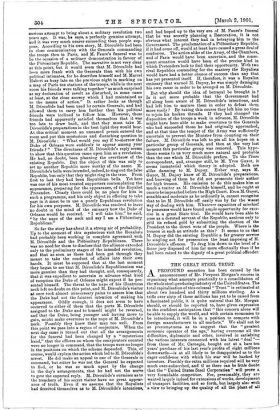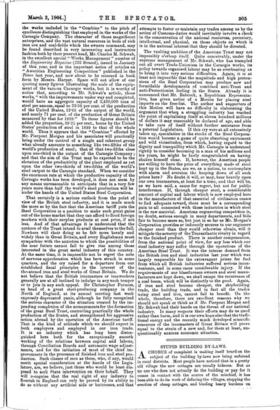THE GREAT STEEL TRUST.
APROFOUND sensation has been caused by the announcement of Mr. Pierpont Morgan's success in orgauising what amounts practically to a consolidation of the whole steel- producing industry of the United States. The total capitalisation of this colossal" Trust" is estimated at about two hundred and thirty millions sterling. As a trifle over sixty of these millions has yet to be raised from a fascinated public, it is quite natural that Mr. Morgan should, or should be reported to, have given expression to the confident anticipation that "this concern alone will be able to supply the world, and with certain economies to be introduced, it will be in a position to compete with foreign manufacturers in all markets." We shall not be so presumptuous as to suggest that the "greatest economic operator of the age," having overcome all the difficulties, diplomatic and other, involved in satisfying the various interests connected with his latest " deal "— from those of Mr. Carnegie, bought out at a bare ten years' purchase of his last year's profits of eight millions downwards—is at all likely to be disappointed as to the eager confidence with which his star will be backed by investors. Possibly the extra millions required will be very much over-subscribed, and if so there can be little doubt that the "United States Steel Corporation" will prove a very formidable competitor. For, presumably, they are wanted largely indeed for extensions of works, development of transport facilities, and so forth, but largely also with a view to bringing up the quality of all the plant of all the works included in the " Combine " to the pitch of excellence distinguishing that employed in the works of the Carnegie Company. The character of those magnificent enterprises, and the vast natural resources in beds of rich iron ore and coal-fields which the owners command, may be found described in very interesting and instructive fashion both by their present head, Mr. Charles M. Schwab, in the excellent special "Works Management" number of the Engineering Magazine (222 Strand), issued in January of this year, and in the important series of articles on "American Engineering Competition" published in the Times last year, and now about to be reissued in book form by Messrs. Harper. Space will not allow of our quoting many figures illustrating the scale of the equip- ment of the various Carnegie works, but it is worthy of notice that, according to Mr. Schwab's article, those works," with the improvements under way and completed, would have an aggregate capacity of 3,430,000 tons of steel per annum, equal to 32-56 per cent. of the production of the United States, 12.65 of the output of the world, and nearly 71 per cent, of the production of Great Britain measured by that for 1899." To these figures should be added the proportion, 39.25 per cent., borne by the United States' production of steel in 1899 to that of the whole world. Thus it appears that the "Combine" effected by Mr. Pierpont Morgan and his associates will practically bring under the control of a single and coherent group what already amounts to something like two-fifths of the world's production of steel; that of that two-fifths close upon one-third is the output of the Carnegie Company ; and that the aim of the Trust may be expected to be the elevation of the productivity of the plant employed as yet upon the other two-thirds of two-fifths of the world's steel output to the Carnegie standard. When we consider the enormous rate at which the productive capacity of the Carnegie works has been developed, it does not seem by any means unreasonable to anticipate that in a very few years more than half the world's steel production will be under the hands of the Uuited States Steel Corporation.
That certainly is a serious outlook from the point of view of the British steel industry, and it is made much the more so by the fact that the American tariff puts the Steel Corporation in a position to make such great gains out of the home market that they can afford to flood foreign markets with their surplus products at cost price, if not less. And of that advantage it is understood that the authors of the Trust intend to avail themselves to the full. Nowhere will their doing so be felt more keenly and widely than in Great Britain, and every Englishman must sympathise with the anxieties to which the possibilities of the near future cannot fail to give rise among those interested in the great metal industry of this country. At the same time, it is impossible not to regret the note of nervous apprehension which has been struck in some quarters, and the cry raised for a departure from our established fiscal principles in the interest of the threatened iron and steel works of Great Britain. We do not believe that the British ironmasters or ironworkers generally are at all inclined to indulge in any such temper or to join in any such appeal. Sir Christopher Furness, as head of a great steel-producing company in the North of England, at its annual meeting last week expressly deprecated panic, although he fully recognised the serious character of the situation created by the im- pending completion of the arrangements for the formation of the great Steel Trust, controlling practically the whole production of the States, and strengthened for aggressive action abroad by the operation of the American tariff. That is the kind of attitude which we should expect in both employers and employed in our iron trade. It is an industry which has long been distin- guished here both for the exceptionally smooth working of the relations between capital and labour, through Conciliation Boards and automatic wage adjust- ments, and for the initiation of most of the chief im- provements in the processes of finished iron and steel pro- duction. Such classes of men as these, who, if any, would merit special consideration at the hands of the Legis- lature, are, we believe, just those who would be least dis- posed to seek State intervention on their behalf. They will recognise that the real right of any industry to flourish in England can only be proved by its ability to do so without any artificial aids or buttresses, and that attempts to foster or maintain any trades among us by the action of Customs-duties would inevitably involve a check in the concentration of the national resources, pecuniary, intellectual, and physical, on those objects on which it is in the national interest that they should be directed.
The vaulting ambition of the American Trust may not impossibly o'erleap itself. Quite conceivably, under the supreme management of Mr. Schwab, who has trampled out all overt Trade-Unionism in the Carnegie works, its policy towards organised labour may be so overbearing as to bring it into very serious difficulties. Again, it is at least not impossible that the magnitude and high preten- sions. of the Steel Corporation may produce new and formidable developments of combined anti-Trust and anti-Protectionist feeling in the States. Already it is announced that Mr. Babcock, a Republican Representa- tive, has given notice of a Motion for placing steel imports on the free-list. The author and supporters of this Motion will have no difficulty in elaborating the argument that whei a struggling industry has reached the point of capitalising itself at eleven hundred millions of dollars it may reasonably be declared of age, and able to take care of itself without further assistance from a paternal Legislature. If this cry were at all extensively taken up, speculation in the stocks of the Steel Corpora- tion would become a game of quite absorbing excitement and wild vicissitudes, from which, having regard to the dignity and tranquillity which Mr. Carnegie is understood rightly to consider becoming in a man of his millions and his years, he might be fairly congratulated on having shaken himself clear. If, however, the American people are willing to have the price of everything made of steel kept up in the States, are we, as a nation, to contemplate with alarm and aversion the keeping down of all such prices here ? No doubt it will, or may, bear heavily upon our own ironmasters, at least for a time, and that will be, as we have said, a cause for regret, but not for public interference. If, through cheaper steel, a considerable amount of capital and labour which is now employed here in the manufacture of that essential of civilisation ceases to find adequate reward, there must be a corresponding gain to all connected with those industries in which steel is the raw material. American engineering competition is, no doubt, serious enough in many departments, and bids fair to become more so, but just in so far as Mr. Morgan's Corporation provides or indirectly secures to our engineers cheaper steel than they would otherwise obtain, will it mitigate the severity of the Transatlantic rivalry in regard to the finished product. There is another compensation, from the national point of view, for any loss which our steel industry may suffer through the operations of the American Steel Trust. It was the intense demand from the British iron and steel industries last year which was largely responsible for the extravagant prices for fuel from which all British industries suffered serious incon- venience, and in some cases considerable injury. If the requirements of our blastfurnace owners and steel manu- facturers are kept down, we shall escape the recurrence of a coal boom, which will be distinctly to the good. Again, if iron and steel become cheaper, the shipbuilding trade, the building trade, and in fact all the trades using steel and iron, cannot fail to benefit. On the whole, therefore, there are excellent reasons why we should not speak or think as if Mr. Pierpont Morgan and Mr. Schwab had their hands on the throat of our national industry. In many respects their efforts may do us good rather than harm, and it is our own hope also that the tradi- tional energy and the recently much developed scientific resources of the ironmasters of Great Britain will prove equal to the strain of a new and, for them at least, un- questionably anxious economic situation.







































 Previous page
Previous page